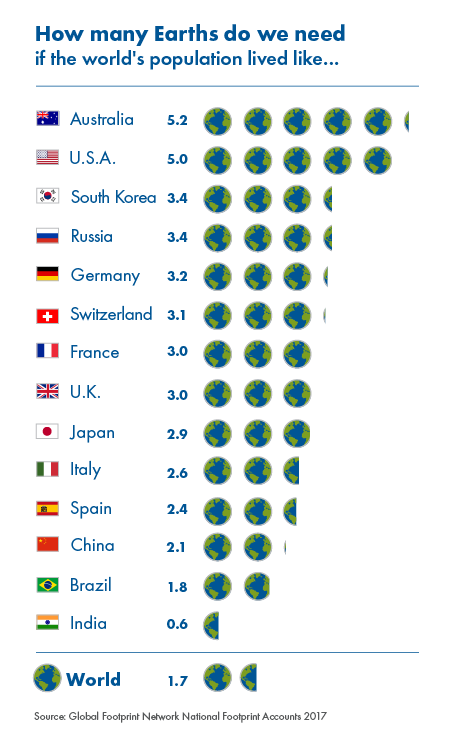Monday, 14 August 2017
Who owns the World?
Noam Chomsky is a very good mind. Worth watching his presentation. He starts with Adam Smith!
"It takes genius not to see it"
Wednesday, 2 August 2017
When policies collide.
Today is Earth overshoot day. It is the day in the year when humanity collectively has used up our annual available eco services. That isn't just direct consumption it is also the ability of the planet to deal with our pollution. It was at 1 in the early 1970's ie back then the planet was just able to handle our impact - there was no overshoot. Since then the day has got inevitably earlier. Another way to look at it is we are collective consuming about 1.7 planet's worth of eco services every year. Imagine spending 1.7 times your income each year. You would be in big trouble pretty quickly unless you have a big pile of wealth behind you. Even then that pile would diminish rapidly. And that is exactly what we see in the world - diminishing fish stocks, less pristine forest, fewer animals both species in many cases numbers.
The impact varies round the world, country by country.
Of course it is crude, but no less so than using GDP to determine whether society is progressing or not. Looking at that country list I would expect Jersey's position would be around the 3.3 planet level. It would be useful to know as an indicator of how we are doing , are we going in the right direction , can we get to a satisfactory, sustainable position before disaster strikes?
It happens that we are in Jersey taking the first steps in developing indicator metrics like the footprint above. That's the ongoing Future Jersey exercise. Imagine 2035 purported to do something similar a decade ago. That fiasco tried to engineer support for one of a pre selection of growth policy ambitions and completely and ignored future impacts like climate change. This current project has some hope of working. The wide ranging questionnaire and topics at the outset of course means we have at the raw data level a set of incoherent ambitions. Resolving those tensions and conflicts is where the real work happens.
It was a great pity that the IJCI report was delayed and therefore couldn't really feed into this Future Jersey activity more fully. It certainly touches on some relevant points . One area the survey suggested was very good in Jersey was being or feeling safe. Yet the evidence given to the Care Inquiry and one of its key conclusions arising is that children in the care system in Jersey continue to be put at risk.
Comments were also made by the ICJI report on decision making, politics and structures in Jersey. Eg form the executive summary " (x) Failure to tackle a silo mentality among public-sector agencies. States departments and institutions have been characterised by territorialism and protectiveness rather than openness to pooling resources and learning. As a result, there has been a lack of a comprehensive strategy to secure the bests interests of children in the island." Such behaviour and mentality is very unlikely to work when tackling holistic concerns and policies.
I think the work of Future Jersey gives a chance to begin unpicking that silo mentality and get to a position of better decision making and cooperative working across States departments. Intriguingly this opportunity arises from what many would probably see as the biggest weakness of the whole Future Jersey project - it doesn't change anything! And that criticism is largely true.
What we should have when all fifty plus of the indicators in the report are developed is a set of metrics to serve as a decision support tool. Every strategy and report could then be assessed against the metrics to see its impact and ensure aspects outside of the immediate expected consequences are considered. In theory we then get better decisions.
Quite what mechanics will be deployed to achieve hasn't been described. We already have a requirement in States propositions to complete a statement of manpower and financial implications. Having a statement of all fifty indicators might be to cumbersome, but it would put the factors up front in proposals. An alternative would be to have scrutiny review against the criteria. There are a few concerns here as scrutiny panels are segregated by area of interest and wouldn't necessarily have knowledge across all the factors. Also scrutiny do not call in all propositions for scrutiny, and occasionally policies don't even get to scrutiny or even the the States assembly (eg the current Rural economy strategy). As a third option we could have someone independent - equivalent of the Comptroller and Auditor general using the metrics to review , but that would certainly be retrospective, missing the main benefit of informing debate in the chamber.
However it comes into being we desperately need a mechanism for reviewing policies and actions in the round. These decisions are hard, sometimes very hard. I think about the impacts of my actions a lot , but I still find it hard to get to an acceptable sustainable position in my own life. I've sometimes been called a zealot or idealist trying to align what I believe is necessary with how I do things. But even with my 'extreme' decisions, even my footprint doesn't quite get to the necessary 1 planet level.

You can get a footprint for yourself at http://www.footprintcalculator.org/#!/
The Future Jersey report is at FUTURE JERSEY
Subscribe to:
Comments (Atom)
